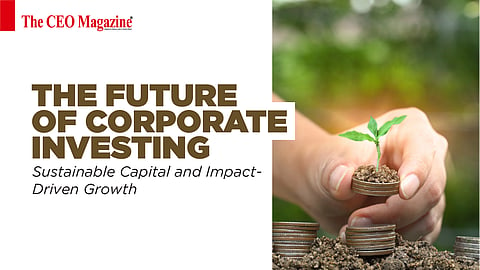
- News
- Women
- Magazine
- IndustryIndustry
- InsightsInsights
- Success Stories
- PublishPublish
- ContactContact
- Media KitMedia Kit

The Future of Corporate Investing: Sustainable Capital and Impact-Driven Growth
Corporate investing is moving into a phase where financial ambition is inseparable from responsibility. For decades, companies chased growth defined by rising stock prices and expanding balance sheets. But the vulnerabilities of this model, resource dependency, climate instability, workforce burnout, and social inequity, have forced a rethink. The future belongs to organisations that understand that profit and purpose are not opposing forces but interconnected drivers of resilience. As global markets and ecosystems evolve, sustainable capital is emerging not as a moral choice but as a competitive necessity.
The acceleration of climate-related disruptions, supply chain breaks, and regulatory demands has revealed weaknesses in traditional investment strategies. Companies that once relied on resource-heavy operations are discovering that environmental inefficiency directly threatens long-term profitability. At the same time, organisations that adopted sustainable practices early have gained insulation from volatility. Their assets depreciate slower, their operations consume fewer resources, and their risk exposure is significantly reduced. This shift has pushed sustainability into the core of boardroom conversations, not as an obligation but as smart business.
Impact-driven investments no longer sit at the periphery of corporate portfolios. Instead, they are becoming central to long-term value creation. Whether it's renewable energy infrastructure, regenerative agriculture, clean mobility, or circular economy models, companies recognise that addressing real-world problems yields durable financial returns. These investments reduce future liabilities and open new pathways of innovation. What was once viewed as “ethical spending” is now considered strategic capital deployment, with measurable contributions to profitability and risk reduction.
The modern customer base is more aware, more vocal, and far more discerning. Transparency has become unavoidable, and brands are judged by more than their products. Consumers evaluate companies based on what they invest in — whether it's clean energy, ethical sourcing, community development, or fair labour systems. Sustainable capital has evolved into a language of trust. Organisations that neglect it face scepticism, while those that embrace it gain loyalty, advocacy, and significantly better brand resilience.
A silent but powerful force behind the sustainability shift is the modern workforce. Younger professionals entering the corporate landscape expect their employers to operate responsibly. They want to contribute to companies that reflect their ethics and worldview. As talent becomes a defining competitive edge, organisations have realised that their investment decisions influence not just the market but also the morale and retention of their employees. Sustainable capital attracts committed teams who see their work as more than a job, they see it as meaningful participation in progress.
The idea of impact is no longer abstract. Advances in AI, IoT, climate modelling, and real-time analytics now allow companies to measure environmental and social outcomes with precision. Energy use, carbon emissions, water consumption, waste patterns, and community benefits can all be tracked and validated. This transparency transforms sustainable investing from a goodwill gesture into a data-driven strategy. Organisations can quantify returns, forecast risks, and demonstrate tangible value to stakeholders, reinforcing the credibility of impact-driven decisions.
Corporate investing is expanding beyond revenue streams and into the broader ecosystems companies depend on. This involves nurturing local suppliers, supporting sustainable resource practices, funding community infrastructure, or accelerating startups focused on climate and social innovation. These investments might not immediately appear in quarterly results, but they fortify long-term stability. Stronger ecosystems mean fewer disruptions, more reliable supply chains, and deeper trust within the communities that support the business.
One of the most dramatic transformations in corporate investment philosophy is the acceptance of blended value, the idea that financial returns and social or environmental outcomes are not separate categories. A single investment can reduce emissions while lowering costs, improve employee wellbeing while enhancing productivity, or support local communities while strengthening supply networks. Impact-driven growth is proving that responsibility does not dilute profitability; it amplifies it.
The definition of growth is changing. Instead of relentless expansion, the focus is shifting to adaptability, resilience, and long-term security. Companies that operate without sustainable principles may scale quickly, but they also collapse more dramatically. The future belongs to organisations with models designed to endure. Sustainable capital reduces vulnerability to global shocks, giving businesses a stable foundation to innovate and expand. Growth built on responsibility is slower but significantly more durable.
Governments worldwide are intensifying environmental regulations, imposing stricter reporting standards, and incentivising green innovation. For companies, ignoring sustainability is no longer an option. Regulations are shaping investment strategies, pushing businesses toward cleaner technologies, transparent reporting, and ethical practices. Those who adapt early gain an advantage, while those who delay face increasing compliance costs and reputational risk.
What makes this moment historic is the scale of the transformation. Sustainable capital is shaping innovation, governance, supply chains, consumer behaviour, and workforce culture, all at once. It is redefining what it means to lead, grow, and succeed in the corporate world. In the coming years, the companies that thrive will be those that recognise capital not just as a financial instrument but as a force that shapes society and the planet. The future of corporate investing lies in decisions that strengthen the world while strengthening the business. Impact-driven growth is no longer a niche philosophy; it is the blueprint for the next era of global enterprise.
Follow us on Google News
